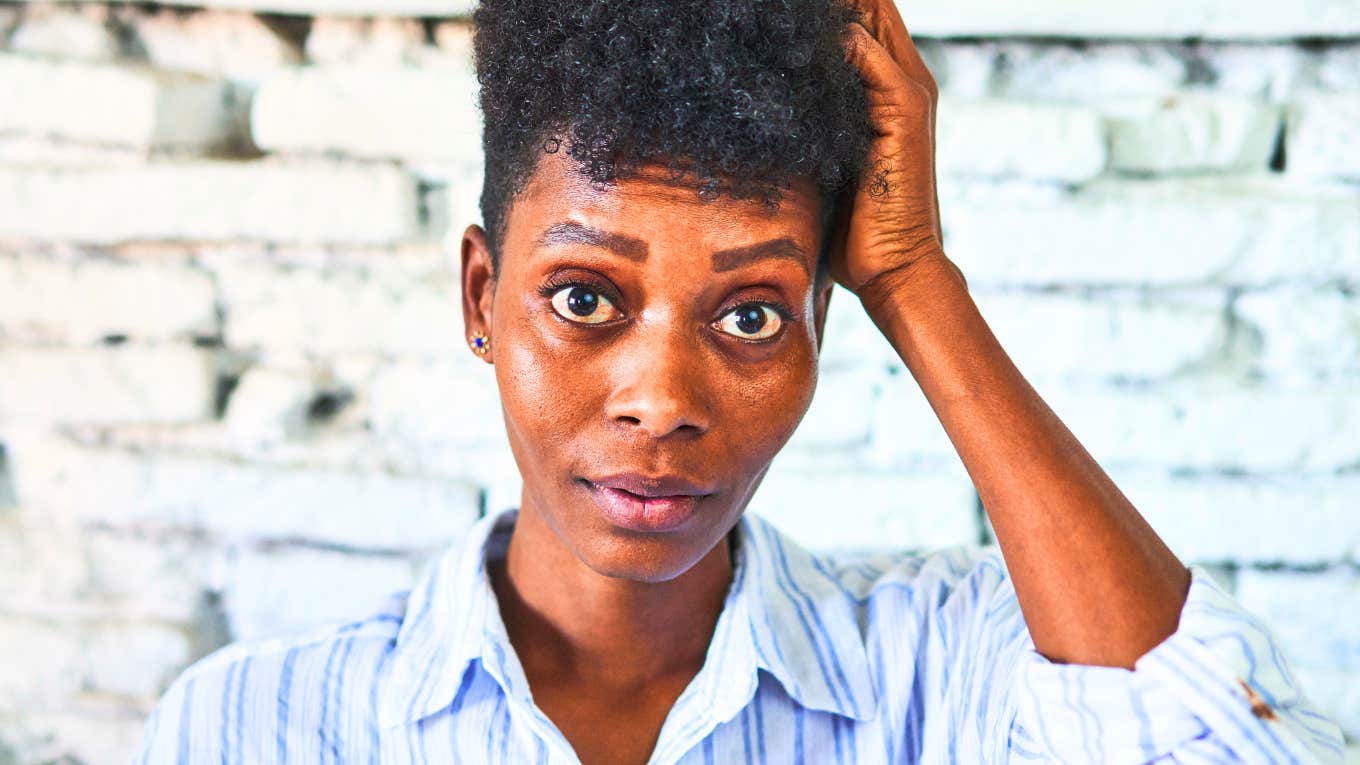People Who Are Secretly Socially Awkward Casually Drop These 11 Subtle Clues In Conversation
When you hear these subtle clues in a conversation, a socially awkward person might be trying to connect with you.
 Asier Romero / Shutterstock
Asier Romero / Shutterstock Have you ever been in the middle of a conversation with some friends when someone abruptly adds a comment that steers it off course? It may seem like this person was being rude, but often they're really just socially awkward. It can be pretty obvious when you're in the presence of a socially awkward person. Still, the best thing you can do is help them feel as though they fit in and not contribute to the awkwardness, which can ultimately only make them even more uncomfortable.
Whether you have that random coworker who laughs a bit too hard at jokes that weren't meant to be that funny, or if you spot someone trying to add a comment to the conversation but can't seem to find the right time, spotting a socially awkward person isn't that hard when you notice these signs.
People who are secretly socially awkward casually drop these 11 subtle clues in conversation
1. They laugh too late (or too early)
 Andrii Nekrasov | Shutterstock
Andrii Nekrasov | Shutterstock
Someone who is socially awkward and finds themselves in conversations they're not sure how to respond to usually opts to mimic what everyone else is doing, which often means laughing. Throughout the conversation, they focus solely on cues to indicate when they should react; sometimes they get it right, other times it leads to a slight, awkward pause in the conversation.
Research has shown that when laughter erupts in a conversation, it's usually used as a social tool rather than as a response to what the person said that was humorous.
2. They repeat what was just said
 Alessandro Biascioli | Shutterstock
Alessandro Biascioli | Shutterstock
When a socially awkward person finds themselves in a conversation, they often feel unsure what to contribute and tend to repeat what someone else just mentioned. To them, this can be a way to show the other person that they were actively listening or to fill any silence between sentences.
This type of person can repeat someone else's words word-for-word, or they can reaffirm what someone just said. By doing this, they don't have to contribute anything new to the conversation, yet still seem to be part of it.
3. They overexplain
 Fizkes | Shutterstock
Fizkes | Shutterstock
Telling stories or jokes can be easy for some people, but for those who are socially awkward, it can be hard to get their point across. A short story turns into a 30-minute conversation because this type of person keeps explaining small details that turn out to be irrelevant. The same can apply to jokes. Socially awkward people don't just tell their jokes. They have to explain them to ensure everyone understands.
When someone overexplains, it's out of fear of being misunderstood. They may also strive for perfection and try to avoid any form of rejection.
4. They give too much eye contact, or avoid it completely
 MDV Edwards | Shutterstock
MDV Edwards | Shutterstock
Socially awkward people tend to overthink every little thing and often struggle to determine what a normal amount is, including the appropriate amount of eye contact. If you've ever been stared at too long during a conversation, even after you stop talking, the person might not be a creep. They might have horrible social awkwardness.
On the other hand, some might find it easier not to make eye contact at all. This can be an easy tell, especially when everyone else is looking at the speaker or each other.
5. They randomly overshare
 Dekazigzag | Shutterstock
Dekazigzag | Shutterstock
When someone randomly starts to overshare during an everyday conversation, it can get pretty awkward really fast. This type of person probably doesn't know what else to contribute to a conversation, and so they decide to just start talking about themselves.
It's not uncommon to resort to oversharing when someone gets nervous and has nothing else to add to the conversation. However, in the end, it doesn't just make the person who overshared feel awkward; it makes everyone else feel awkward, too.
RELATED: 3 Situations Where Oversharing Backfires, According To Clinical Psychologist
6. They're self-deprecating
 Mango Star | Shutterstock
Mango Star | Shutterstock
It's no secret that socially awkward people find it difficult to have normal interactions with others. Still, sometimes they acknowledge their awkwardness and start self-deprecating to shrug it off.
You might hear them say, "I don't know why I said that, I'm so stupid." Small comments like these can build tension and make others feel uncomfortable, causing them to back away from the conversation.
7. They give weird compliments
 Fizkes | Shutterstock
Fizkes | Shutterstock
Socially awkward people often struggle to know what to say next in a conversation and may sometimes choose to be positive by complimenting the other person. This can backfire when the compliment is unwarranted and weird. Of course, they are just trying to be sweet, but some of the things they say may come out offbeat.
This can oftentimes also derail a conversation amongst friends. They could be talking about a serious subject, and when this socially awkward person doesn't know how to contribute, they might say something odd, such as, "You have an interesting mind."
8. They interrupt
 Ultramansk | Shutterstock
Ultramansk | Shutterstock
When it's evident that someone never knows when to speak up or ask a question, it's a sign of social awkwardness, which often leads them to cause rude interruptions, whether they mean to or not. If they have a question about what you're talking about, they're not going to let themselves forget it, so they'd rather interrupt your flow and ask the question abruptly rather than allowing you to finish first. To them, this might be active listening, but it really just comes across as rude.
People who do this may even come across as egotistical, deeming your words more worthy of attention than others.
9. They'll be overly polite
 Fizkes | Shutterstock
Fizkes | Shutterstock
Many socially awkward people add to their awkwardness through overthinking, which can lead them to be overly polite when one thank you is enough. They could be ordering something and keep thanking the worker. They could also be stumbling over their words, and they keep apologizing. When someone is around this type of person, it can be tiring having to reassure them that it's okay and they don't need to repeat themselves.
Being overly polite in a conversation can even be hurtful for this person. When someone tries to sugarcoat everything with politeness, their true intention in the conversation can get lost in translation. It can even lead someone to take advantage of the person.
10. They start to sound monotone
 SeventyFour | Shutterstock
SeventyFour | Shutterstock
When someone who is socially awkward is unsure of the conversation's tone and doesn't want to mess it up, they might end up staying neutral and monotone. Not only can this end up sounding weird, but adding emotional depth to your responses can, more often than not, help in a conversation and show that you genuinely care about what the other person is saying.
Having a monotone voice can also lead to being misunderstood. This person might be saying something serious but be mistaken for a joke.
11. They mirror your expressions
 Pics Five | Shutterstock
Pics Five | Shutterstock
Wanting to blend in is the goal of many socially awkward people, and one way they try to achieve it is by mirroring others' expressions. They're so focused on looking "normal" that they don't realize what the conversation is even about, so they don't know how to react. They look around, hoping to find someone who can guide them toward a sense of normalcy.
They laugh when you laugh, and they pretend to act shocked when everyone else is. Learning to let go and truly live in the moment is the only way someone who feels awkward in social settings can be themselves, not just what others expect.
People who seem "off" during a conversation might actually care deeply about the interaction. There's no need to call them out, as it might make it worse, but try and involve them slowly.
Doreen Albuerne is a writer with a bachelor's degree in journalism, covering relationships, mental health, and lifestyle topics.

